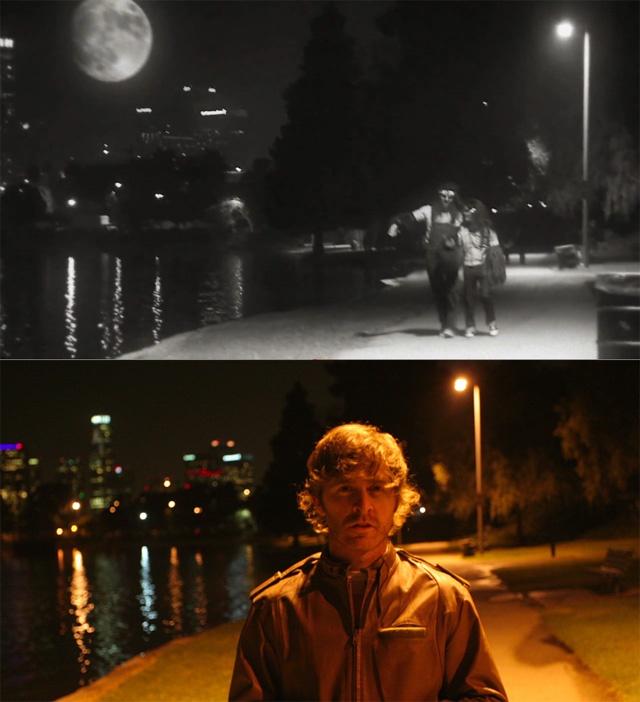09 Dec Lex Halaby, Interview Part 2
hey friends,
here’s the final part of my interview with Lex Halaby! enjoy=)
—–
LG: So what the heck do you do?
LH: I’m a director. I like to think writer/director even though I haven’t directed a feature film. I write the concepts and scripts the both my short films and music videos. When I do commercial work the concept has been hashed out by the agency already so my role is different. I don’t like to say that I’m one kind of director or another. I don’t want to just do music videos, or commercials, or narrative – I like to do it all.
LG: You’ve done some documentary stuff to, right?
LH: Yeah, in fact right now I’m working with a really talented editor, Ryan Brown on a documentary I shot in London. It’s about a performing arts school called “Chickenshed.” They are a really interesting, progressive school that incorporates people from all backgrounds, all ages, and all abilities into one performing arts troupe. The work they do is really amazing and they’ve become a leading example of what you can do by incorporating all types of people.
There’s people that are physically handicapped, mentally handicapped, and completely able bodied all performing on stage together. We interviewed students in the school, the faculty, and the founders. We also filmed their rehearsals and performances and are in the process of creating a short documentary about the message and principles that they are built on.
LG: Is this something that they gave you the script for? Or did they give you a “Thesis statement,” something that said “we want want a piece that communicates these ideas?”
LH: No, actually in the case of “Chickenshed” they were really open to how I wanted to approach the subject. I went out there and for the first week I just took in the school. I sat in on as many classes as I could and got to know people. I got to see them perform and see what they do. And from that I was able to start putting together my ideas for the structure of the piece. Then I developed questions for the interviews that fit into that structure for the film. After shooting 12 hours of interviews I was able to find the right cut-aways and b-roll footage to compliment and exemplify what they were saying.
LG: I think it’s really smart that you spent that week just being there and being in the moment, absorbing it before you started shooting. Do you use a similar technique on your non-documentary projects?
LH: In the creative process, it’s really important for me to be on location as much as possible prior to shooting. I do a lot of my visualization on location. You know that from the “Man-Man” video, when you and I went out and looked at stuff and shot photos. It’s important for me to be in the space so that I can be inspired by it and pre visualize things before production.

LG: I remember on one of your recent projects, the Coheed & Cambria video, you went to the location a couple time before you shot, right?
LH: Yeah I went out to Victorville, CA a few times. The first time was to find locations and make the decision that yes, Victorville was the place to shoot. The second time was to look at the locations more carefully and think more in terms of blocking. We also did some lighting tests with the camera to find out when the best time to shoot certain scenes would be. Victorville is a couple hours away, but I knew I couldn’t show up on the day of production and not have those fundamental decisions made already – cause then it’d just be mass confusion.
LG: So tell me a little bit more about this project.
LH: The record label and band’s management came to me with a creative brief and said “we want to do something very different with this project.” They were open to it being more than a normal music video. The brief included a section from Claudio, the singer, with certain themes that the song’s lyrics touched on. So I those themes and incorporated them into a short film script. I pitched it as a “music video/short film hybrid using the song as the score.” They liked it, and I booked the job.
It was an interesting experiment working dialog in and out of a music video. There are times where you hear the music and lyrics and times where it’s just an instrumental version of the song with dialog from the characters. I think we achieved something unconventional and different which is what we set out to do.
And people have responded to it. G4 did a premiere of it on “Attack of the Show” and a shorter version w/o dialogue went to MTV. It was a great opportunity and I’m glad I got to take advantage of it.
LG: What’s the logline?
LH: It’s about three teenagers who live in a small desert town that’s turned against them. Through the course of the video you slowly discover why.
LH: I’m also developing it as a longer form short film, separate from the music video. Originally I wrote a longer script then I paired the footage down in editorial to work with-in the constraints of a music video. There other scenes and dialog that were too long to air, but will be great in the festival version.
LG: So what stage is the short film in?
LH: The longer form version of the Coheed & Cambria video is currently being edited. Then it will need a new sound mix and score because the timing will have changed. It will be a few weeks before I get into the meat of it, because I’m doing this version out-of-pocket and since requires some favors — I have to work at a “favor pace.”
LG: I think it’d be interesting to tell people what a “favor pace” means. ‘Cause I know what you mean, but I’m not sure all of our readers will.
LH: Sure. When I say a “favor pace” it means that people are going to do the work between their paying gigs and in their spare time as a “favor” to you. So things move slower when you are asking people to work for free.
If you have a little bit of money, it definitely helps, so sometimes I will pay out-of-pocket just to keep things moving.
LG: It’s the whole “better, faster, cheaper” thing.
LH: It’s the triangle: quality, time, and money. If you don’t have much money and you want high quality you gotta give somebody a lot of time with it.

LG: So what other projects are you working on right now?
LH: I just directed a project for Coca-Cola’s new Christmas jingle, a music video for the band Train, and a music video for Kimberly Caldwell from American Idol. It’s been a really busy month and balance all the projects has been a challenge, albeit an enjoyable one. Those should all be released in the coming weeks.
Before that I did a large Latin video for Juanes, international latin rock-star. That was a great experience. He was fantastic to work with, we got along really well, and it’s a beautiful video. I think we hit the themes and tone of the video perfectly.
It takes place all at night, outside on city streets. You don’t see anyone at all, it’s completely empty, but you do see people’s shadows. So Juanes is walking through an empty city with the shadows of a bustling city all around him.
LG: So do you have any writing projects right now?
LH: Well, I’m pitching on quite a few music videos and a couple commercials right now. And in my personal writing I am developing a graphic novel and some short scripts. I think the graphic novel is going to be my next major undertaking. I just met wih my friend Skip Martin who’s just published his graphic novel, “Bizarre New World” and talked with him about the next steps I need to take in order to get it made.
LG: What inspired you to work on a graphic novel?
LH: Graphic novels are very creatively freeing to me. There’s no limitations from a storytelling and budget standpoint. It costs the same amount to draw a character sitting alone on a park bench as it does to draw a character flying a massive spaceship through a black hole. There’s no budget constraints and therefore far fewer creative constraints. Of course the quality of the art and printing all cost money but not in the same way it does in filmmaking.
There’s many stories I’d like to tell that are too expensive for the screen and graphic novels allow me to bring these visual stories to life. It’s still something I’m exploring, but very excited about the possibilities of the medium.
LG: What were the graphic novels that have been inspiring you?
LH: “Scalped” and I’ve also really enjoyed the “Walking Dead” series.
LG: Can you think of any examples where inspiration has come from an unexpected place?
LH: I’m usually inspired when I’m traveling or when I’m somewhere where there’s a lot of visual motion. If I sit and watch cars, or I’m at the airport, or just watching people walk by I’m able to think much better than if I’m starring at a screen.
Usually when I’m writing I just walk around the house in circles. I can’t just sit if I’m trying to break an idea. I think all my ideas come from movement and action.

LG: I like that bit about motion, how it lets you disconnect and hit those other areas of your brain.
LH: Yeah, I didn’t even realize that until a few years ago. Once I realized it, it really helped. It’s really hard for me to just write in front of my computer. That’s why I really need to get my laptop fixed [laughs] so I can be somewhere else. [LG laughs]
The other thing I do, just from a productivity standpoint, is run a program called “Freedom.” It blocks all internet access for a certain amount of time. So if I have a hard deadline and I’m getting distracted with emails and the internet, I’ll run that program and it block my internet access for say “the next two hours.” The only way to get it back is to fully reboot the computer, which is a pain, so I don’t do it. And then I get more writing done.
LG: That’s a great productivity tool.
LH: It’s a free program too. [http://macfreedom.com/]
LG: So I think we’re getting close to being done…if you weren’t filmmaking – what do you think you’d be doing?
LH: I spend a lot of time thinking about that. If I wasn’t in film I’d probably be in either politics or journalism. Like NGO [Non-government organization] style politics. Or psychology. [both laugh] I think they are all related in a way. I think that in writing and filmmaking understanding psychology is really important. Especially for understanding motivation and how characters interact with each other. Also to understand the psychology of the audience. What do they interpret from the characters on screen? Do they connotate it as positive or negative and how do they react to it? I think those are valuable skills.
I’m always involved in politics and I love to travel. I like to be outside of the US, so that’s probably where the NGO side of things comes from. And journalism, that’s from my love of documentary.
I like picking people’s brains…like you’re doing to me right now. [laughs]
LG: Deep into the dark recess of Lex’s mind we will travel…
LH: Super meta right now. [both laugh]
LG: So what’s your favorite episode of The Real Luke?
LH: I think the trailer that you did was ****ing amazing. I love that trailer. It was particularly funny because the other Real Luke stuff is intentionally so lo-fi and has a homemade feeling, but then this is really huge and epic and I like that contrast.
LG: [laughs] Cool. So where can people see your work?
LH: You can go to my website www.lexhalaby.com and to my production company’s site www.mighty8.tv.
[End Interview.]

So that wraps it up. Definitely some exciting work on the way from Lex!
I really enjoyed picking his brain and finding out about his creative process…it’s an exciting adventure getting to learn more about how my friends work and I’m glad I can share it with y’all!
-Luke


No Comments